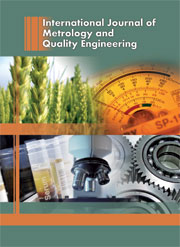Article contents
Establishing an applied training session in metrology at anagricultural engineering school (CIRAD, Montpellier, France)
Published online by Cambridge University Press: 02 December 2014
Abstract
As part of its training activities, SupAgro – Institut des Régions Chaudes (IRC),an agricultural engineering school in Montpellier, has introduced an appliedtraining session in metrology for its students. This was undertaken by the CIRAD metrologyplatform in partnership with the agrifood technology platform of the Qualisud JointResearch Unit. The session comprises two hour workshops during which students can applythe basic notions required for metrological monitoring of the quantities “temperature” and“weight”. To that end, standard weights, a temperature calibration device comprising athermostatically controlled calibration oil bath (uncertainty at k = 2 of 0.14°C) and a standardtemperature probe with an accuracy of ±0.01 °Cwere made available to the technology platform by the CIRAD metrology platform. Duringpractical work, these COFRAC calibrated instruments are used to check balances and, inparticular, make students aware of the importance of parameters that might influence thetemperature measurement of a thermostatically controlled bath (homogeneity, resolution andaccuracy of the thermometers, measurement repeatability, etc.). To that end, the Qualisudteam specifically adapted a water bath so as to be able to position several temperatureprobes at different places in the bath. Students have to acquire an approach that needs totake into account a particular measuring context. The teaching scenario of the trainingsession is structured around these metrological checks proposed directly to the students.The training session takes place each year with 2nd year students on the SAADS 2/IAAScourse “Sustainable Agriculture and Agrifood Systems in the South” at SupAgroin Montpellier.
Information
- Type
- Research Article
- Information
- Copyright
- © EDP Sciences 2014
References
- 3
- Cited by

